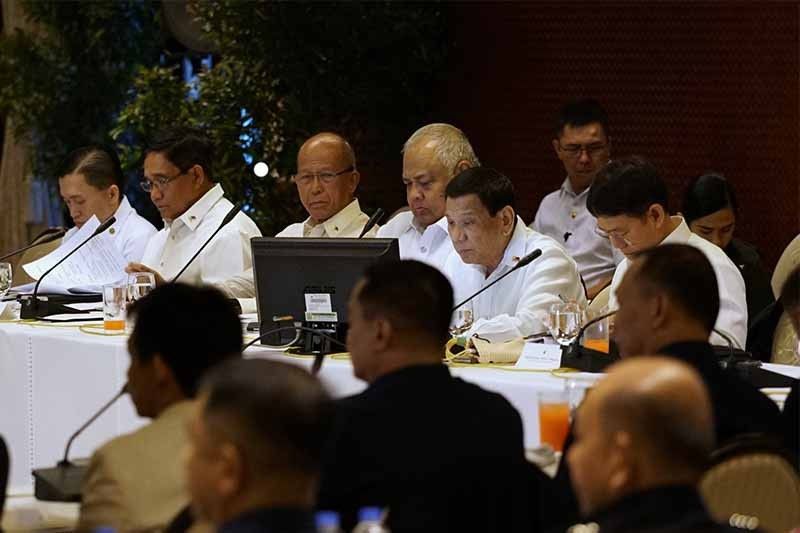Publication not among usual requirements for treaties, agreements
March 15, 2018 | 11:30am

President Rodrigo Duterte presides over joint Armed Forces of the Philippines-Philippine National Police (AFP-PNP) Command Conference at the Malacañan Palace on March 13, 2018.
King Rodriguez / Presidential Photo
MANILA, Philippines (First published on Mar. 15, 2018) — Publication in the Official Gazette is not among the usual requirements for a treaty to be in force, according to jurisprudence and to Philippine guidelines on how treaties are negotiated and ratified.
On Wednesday, Chief Presidential Legal Counsel Salvador Panelo said that the Rome Statute of the International Criminal Court, which the Philippines says it is withdrawing from, is not enforceable in the country in the first place because it did not meet the requirement that it should be published in the Official Gazette or any newspaper of general circulation.
This was a reiteration of President Rodrigo Duterte's statement earlier Wednesday that: "Under our law, particularly the New Civil Code, a law shall become effective only upon its publication in the Official Gazette or in a newspaper of general circulation. Devoid of the legal required publication, the Rome Statute is ineffective and unenforceable."
Pimentel v. Executive Secretary
However, this publication requirement is not present among the steps in the treaty-making process cited by the 2005 Supreme Court decision in Pimentel vs Office of Executive Secretary. The decision was on a petition to compel the Department of Foreign Affairs and the Office of the Executive Secretary to send the signed copy of the Rome Statute to the Senate so it could concur with ratification.
The Supreme Court decided that the decision on whether or not a treaty is t be sent to the Senate for concurrence is up the the president and the Senate's power is only in concurring or rejecting the reatification.
Justice Reynato Puno, who penned the decision, cited the steps in treaty-making process enumerated by former Justice Isagani Cruz in his book on International Law as: Negotiation, signature, ratification and exchange of instruments of ratification.
Cruz said that after ratification, the last step of the treaty-making process is the exchange of the instruments of ratification that would signal the effectivity of the treaty.
Puno, who later became the country’s chief justice, said that Executive Order 459 issued by former President Fidel Ramos stated that upon concurrence of the Senate the Foreign Affairs Department should comply with the provision of the treaty in effecting its entry into force.
According to the Rome Statute, it will enter into force on that first day of the month after the 60th day following the date of the deposit of the 60th instrument of ratification, acceptance, approval or accession with the Secretary General of the UN.
“For each State ratifying, accepting, approving or acceding to this Statute after the deposit of the 60th instrument of ratification, acceptance, approval or accession, the Statute shall enter into force on the first day of the month after the 60th day following the deposit by such State of its instrument of ratification, acceptance, approval or accession,” Section 2 of Article 126 of the Rome Statute says.
According to press statements from the Senate, it has concurred in the ratification of several agreements under the Duterte administration, including:
- The Free Trade Agreement Between the European Free Trade Association States and the Philippines
- Framework Agreement on Partnership and Cooperation Between the Philippines and the European Union
- Agreement Between the Republic of the Philippines and the Federal Republic of Germany on Social Security
- Agreement on Social Security between the Republic of the Philippines and the Kingdom of Sweden
These treaties have not been published in the Official Gazette and its website does not have a category for treaties and agreements.
Publication is also not among the requirements listed in "Philippine Treaty Law and Practice", which is posted on the Department of Foreign Affairs' Philippine Treaties Online website.
Neither is publication required in Executive Order No. 459, Providing For The Guidelines In The Negotiation of International Agreements And Its Ratification, which, incidentally, is published on the Official Gazette.
EO 459 says that "upon receipt of the concurrence by the Senate, the Department of Foreign Affairs shall comply with the provision of the treaties in effecting their entry into force."
Philippines still obligated to assist ICC despite withdrawal
Panelo said that nobody would prevent the prosecutor of the International Criminal Court from pursuing a preliminary examination into allegations of extrajudicial killings under the government's war on drugs, but said that as far as the Philippines is concerned, it is no longer a state party to the Rome Statute.
"How can they continue it. It's possible that they themselves did not think that it's not enforceable," Panelo,a lawyer, said.
According to Article 127 of the treaty, a party to the Rome Statue cannot be discharged from its obligations under the treaty during the time it was a party despite its withdrawal.
Section 2 adds that a state's withdrawal will not affect its cooperation with the International Criminal Court in connection with criminal investigations and proceedings, stressing that a state party has a duty to cooperate with processes that commence prior to the effectivity of the withdrawal.
A withdrawal would also not prejudice the continued consideration of any matter already under consideration by the ICC prior to the date when the withdrawal became effective, it says.
BrandSpace Articles
<
>
Philstar
x
- Latest
- Trending
Trending
Latest
Trending
Latest
Recommended






























